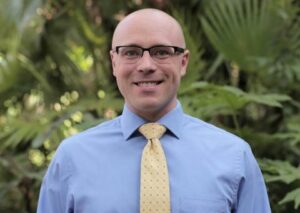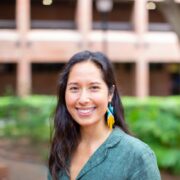Research Spotlight: Christopher Anthony
Q & A with Christopher Anthony, Ph. D., Assistant Professor in the  School of Special Education, School Psychology, & Early Childhood Studies
School of Special Education, School Psychology, & Early Childhood Studies
What research are you currently working on?
I always have several projects in progress, but the one that I’m most excited about involves developing better assessment tools for measuring what we call academic enablers. Academic enablers are skills, attitudes, or behaviors that aren’t academic skills, but are critical for fostering learning and growing in the classroom and beyond. I focus on four in particular: classroom interpersonal skills (e.g., whether a student can work effectively with peers to complete a class assignment), academic engagement (e.g., whether a student can attend and participate in class), motivation (e.g., whether a student can persist in the face of academic challenges), and study skills (e.g., whether a student can strategically organize materials to more efficiently learn and remember academic content).
These types of skills are very important and intuitive, but they are hard to measure. The most carefully designed measures are rating scales in which a teacher (or students themselves) complete several questions used to estimate their current levels of various academic enablers. These measures are important both as the foundation for scientific research to understand and promote academic enablers as well as practically to identify students in schools who need help in these domains and to determine whether the help they get is working.
I’m currently working with several close colleagues on an IES-funded grant to revise one of the most prominent measures of academic enablers available, the Academic Competence Evaluation Scales. This project is utilizing some advanced statistical approaches (Item Response Theory) that haven’t been used at this scale for this type of assessment. Furthermore, we are getting large, diverse samples to facilitate broad consideration of the technical functioning and fairness of the items we have written. Data collection is ongoing and yielding exciting results that promise to set a strong foundation for academic enabler measurement for years to come.
What is the broader impact of your research?
The COVID-19 pandemic has put the importance of academic enablers into stark relief. In fact, I recently collected a nationally representative sample of students (K-8) academic enablers with some pretty dramatic and troubling results. Academic enablers in the Spring of 2022 were roughly ¼ of a standard deviation lower overall, compared with pre-pandemic levels. For certain subgroups (K-5 children; students from lower SES backgrounds) and for certain skill domains (interpersonal skills; engagement; study skills) these drops were even more dramatic with some figures exceeding ½ of a standard deviation! To put this in context, the average educational innovation has a positive impact of about .40 standard deviations (Hattie, 1987), which indicates that for many children, substantial educational intervention and innovation will be needed just to catch kids up to pre-pandemic levels of academic enablers (to say nothing of promoting academic enablers beyond pre-pandemic levels).
Thus, it is undoubtedly the case that academic enablers will need to be part of the comprehensive response to learning loss due to the pandemic. Indeed, I am currently working on accompanying intervention resources to help meet these needs and promote students’ lifelong learning trajectories. Academic enablers are critical factors not only for school based learning, but also for learning after graduation and the completion of formal schooling. With this in mind, I think that academic enablers will need to be emphasized even more in light of the COVID-19 to not only catch kids up, but also to push them forward into a future of lifelong learning and growth.
What other research topics are you interested in?
The other big area I focus on is social emotional learning (SEL), which refers to the skills and behaviors that students (and adults!) need to understand their own and others’ emotions/behaviors, get along with others, and make responsible decisions. As with academic enablers, the importance of these skills has been made even more apparent by COVID-19 and the accompanying difficulties that face students in schools today. Like academic enablers, most of my work in the SEL space has to do with improving assessment to foster better approaches for nurturing students’ SEL growth. I’m one of the lead authors of a widely used SEL measure, the Social Skills Improvement System – SEL Brief Scales, which are used in schools across the U.S. and in research in 19 countries across the world! I conduct ongoing research to better understand how to interpret and use scores from these measures to help kids in their SEL development, which, again, is particularly critical in the aftermath of the COVID-19 pandemic.
Besides academic enablers and SEL assessment/intervention work, I also research theories of how development of these skills, attitudes, and behaviors is affected by kids’ home and school environments using large datasets and advanced statistical analyses. In that vein, I also recently co-authored a statistics textbook for beginners. My hope with all my work is to better understand and promote students’ success in school and beyond.








